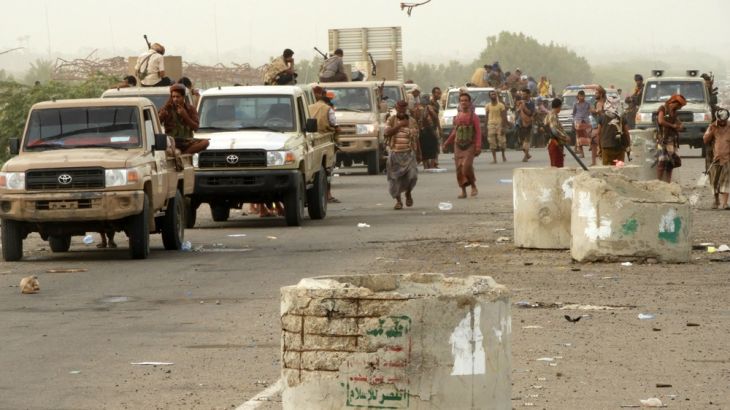Saudi, UAE coalition enters airport compound of Yemen’s Hudaida
Losing Hudaida would weaken Houthi rebels by severing supply lines from Red Sea port city to their stronghold in Sanaa.

The battle between a Saudi and Emirati-led coalition and Houthi rebels has entered the main compound of Yemen’s Hudaida airport, according to a Yemeni military source and resident.
Saudi and UAE backed forces stormed the gates of the airport on Tuesday, according to sources on the ground, while Houthis used tank, artillery and mortar fire to shell the inside of the airport.
Keep reading
list of 4 itemsUS sanctions shipping firm accused of links to Iran, Yemen’s Houthis
Vessel struck in Red Sea as Houthis promise attacks on more shipping lanes
What we know about deadly Houthi attack on cargo ship
“They have stormed the airport,” a Yemeni military source told Reuters news agency.
The facility was stormed after fierce battles broke out early in the morning between coalition forces and Houthi fighters who hold the main port city of Hudaida.
On Monday, Saudi and UAE Apache attack helicopters pounded Houthi positions as civilians fled in search of shelter from the biggest battle of the war in three years.
The attack reportedly targeted Houthi snipers and fighters positioned on rooftops of schools and homes in the Manzar neighbourhood near Hudaida’s airport compound, residents said, in fighting that has wounded dozens of civilians and prevented aid organisations from reaching parts of the city.
While most of the intense fighting is in Hudaida, Houthi media reported more than 40 air strikes in other parts of Yemen over the past 24 hours.
Losing Hudaida would significantly weaken the Houthis by severing supply lines from the Red Sea port city to their stronghold in the capital, Sanaa, and possibly depriving an estimated 70 percent of the population of access to food and medicine.
It could also give an edge to the Western-backed Saudi and UAE-led coalition that, despite superior weaponry and firepower, has failed to defeat the Houthis in a war that has killed 10,000 people and created the world’s most urgent humanitarian crisis.
Speaking to Al Jazeera Sami Hamdi, editor-in-chief of the International Interest, highlighted how essential the city’s airport and seaport are for the coalition forces and the Houthis.
“The Houthi gamble has always been that as long as they can stay in Sanaa and Hudaida, then international pressure will force Saudi Arabia to the table to discuss negotiations.
“Taking the airport and seaport are absolutely fundamental for the coalition forces because this is the battle that will cut off the lifeline for the Houthis.
“If Hudaida is taken, there will be a severe weakening of the Houthis’ position and it may very well force the Houthis into a fight for survival which may make them take negotiations more seriously.”
The battle for Hudaida, launched seven days ago, could drag on, inflicting more suffering on civilians who have already endured air raids, port blockades, hunger and a cholera epidemic.
In a post on social media late on Sunday, Anwar Gargash, the UAE’s minister of state for foreign affairs, said that a coalition victory in Hudaida “will pull the Houthis back to the negotiating table”.
‘Grave worry’
Tens of thousands of residents have fled the fighting along Yemen’s western coastline where pro-government fighters backed by the Saudi-led coalition are engaged in fierce battles with Houthi rebels.
Stephane Dujarric, the spokesperson for UN Secretary-General Antonio Guterres, told reporters on Monday that about 5,200 families, or around 26,000 people, have sought safety within their own districts or in other parts of Hudaida governorate.
“The number is expected to increase as hostilities continue,” he said.
Earlier, UN human rights chief Zeid Ra’ad al-Hussein voiced concern that the Saudi Arabia and United Arab Emirates-led military operation in Yemen could endanger millions of civilians.
“I emphasise my grave worry regarding the Saudi and Emirati-led coalition’s ongoing attacks in Hudaida – which could result in enormous civilian casualties and have a disastrous impact on life-saving humanitarian aid to millions of people which comes through the port,” al-Hussein said on Monday.
He was speaking at the opening session of the UN Human Rights Council in Geneva, where he gave an overview of the overall human rights situation while denouncing the threat of growing “chauvinistic nationalism” around the world.